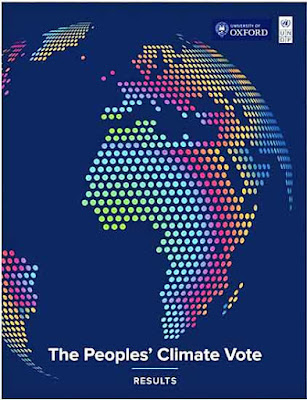Welcome back. In the early years of this blog, I occasionally wrote about my travels as a technical consultant for the United Nations Food and Agricultural Organization (FAO), headquartered in Rome. But my first and last UN consulting assignments were for the United Nations Development Programme (UNDP), based in New York City.
FAO is a specialized UN agency that leads international efforts to defeat hunger. With over 194 member states, FAO works in over 130 countries addressing pretty much everything under food and agriculture.
UNDP works in 170 countries and territories to eradicate poverty while protecting the planet. Toward that end, UNDP helps countries develop strong policies, skills, partnerships and institutions so they can sustain their progress.
I hadn’t seen much about UNDP lately, mainly because I hadn’t looked. Then a major UNDP report appeared on the lists of published research I follow as well as in mainstream media. The 68-page report, titled Peoples’ Climate Vote, documented the largest survey of public opinion on climate change ever conducted--1.2 million respondents spanning 50 countries.
 |
| Peoples’ Climate Vote Report by UNDP and Oxford University. |
The Peoples’ Climate Vote Survey
The goal of the Peoples’ Climate Vote was to convey reliable information to policymakers on whether people consider climate change an emergency and how they would like their countries to respond.
The survey was distributed through advertisements in popular mobile gaming apps (e.g., Words with Friends, Angry Birds) in 17 languages, eliciting a huge, unique sample of people of all genders, ages and educational backgrounds.
Two overview questions asked (1) Do you think climate change is a global emergency? (yes or no) and (2) If yes, what should the world do about it? (everything necessary and urgently; act slowly while we learn more about what to do; the world is doing enough; do nothing).
Policy questions followed, asking what respondents would like their government to do. Three policies plus “none of the above” were offered in each of six areas: Energy, Transportation, Farms and Food, Protect People from Climate Impacts and Nature.
University of Oxford analysts collated, processed and weighted the responses to obtain representative estimates across country groups (high income, middle-income, least developed countries and small island developing states), regions, demographics (gender, age and education) and country-by-country.
Major Peoples’ Climate Vote Findings
Climate Change as an Emergency
In all, 64% of respondents said climate change was an emergency, with country responses ranging from 50% (Moldova) to 81% (U.K. and Italy) and regions ranging from 61% (Sub-Saharan Africa) to 72% (Western Europe and North America).
 |
| Belief in climate emergency by region (from UNDP report). |
Of those that said climate change is an emergency, 59% said the world should do everything necessary and urgently, while only 10% thought enough is being done.
 |
| What governments should do (from UNDP report). |
Top Climate Policies
The four most popular climate policies were: conservation of forests and land (54%); solar, wind and renewable power (53%); climate-friendly farming techniques (52%); and investing more in green businesses and jobs (50%).
Respondents in countries with high emissions from deforestation and land-use change (e.g., Brazil, Indonesia, Argentina) strongly backed conserving forests and land; those in countries with high emissions from the electricity and heating sectors backed renewable energy (e.g., Australia, Canada, Germany). Nearly all G20 countries called for more investment in green businesses and jobs.
The country with the greatest number of respondents not supporting any climate policy was Pakistan (5%) followed by the U.S. (4%). Lack of support does not necessarily mean being against the policies; it could signify indifference.
Sociodemographic Factors
Educational background, particularly post-secondary, was the key driver of climate emergency belief and demand for action in every country.
 |
| Climate emergency belief by people with post-secondary education, by region (from UNDP report). |
Respondents younger than 18 were more likely than other age groups to believe climate change is a global emergency (nearly 70%), yet a majority of each older age group agreed.
Wrap Up
I encourage you to review the detailed results presented in the report. As the UNDP administrator wrote: “The survey brings the voice of the people to the forefront of the climate debate. It signals ways in which countries can move forward with public support as we work together to tackle this enormous challenge.”
Thanks for stopping by.
P.S.
FAO and UNDP websites:
www.fao.org/home/en/
www.undp.org/
UNDP’s Peoples’ Climate Vote report: www.undp.org/content/undp/en/home/librarypage/climate-and-disaster-resilience-/The-Peoples-Climate-Vote-Results.html
Example articles on Peoples’ Climate Vote report:
eurekalert.org/pub_releases/2021-01/tca-wlo012021.php
www.theguardian.com/environment/2021/jan/27/un-global-climate-poll-peoples-voice-is-clear-they-want-action
www.cnn.com/2021/01/27/world/un-climate-poll-global-emergency-intl/index.html
www.bbc.com/news/science-environment-55802902

No comments:
Post a Comment